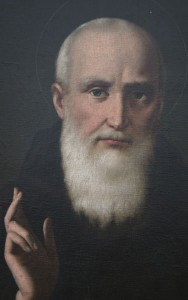Podcast: Play in new window | Download (Duration: 49:13 — 33.9MB) | Embed
Subscribe: Apple Podcasts | Spotify | Amazon Music | Android | Pandora | iHeartRadio | JioSaavn | Podchaser | Gaana | Podcast Index | Email | TuneIn | Deezer | Anghami | RSS | More

The Journey of Prayer – The Life of St. Teresa of Avila – Beginning to Pray with Dr. Anthony Lilles
Dr. Anthony Lilles and Kris McGregor discuss the transformative journey of prayer as experienced and taught by St. Teresa of Avila. Dr. Lilles highlights St. Teresa’s autobiographical work as not just a recount of her life but as an instructional guide on the spiritual journey toward deeper communion with God through prayer.
St. Teresa’s teachings emphasize the progression through different stages or degrees of prayer, which she explores more deeply in her masterpiece, “The Interior Castle.” This progression reflects a soul’s journey from initial efforts in prayer, characterized by personal exertion and devotion, towards the profound experiences of mystical prayer, where God takes the initiative and intimately unites with the soul.
The focus of this episode is on St. Teresa’s use of vivid metaphors, like drawing water from a well and the soul as a garden, to describe the nurturing of spiritual virtues through prayer. These stages of prayer, from vocal and meditative prayer to the more advanced states of recollection, quiet, and ultimately union with God, are accessible to all baptized Christians as part of their spiritual heritage and call to holiness.
Dr. Lilles also addresses common challenges and misconceptions about spiritual progress, emphasizing the importance of humility, confidence in God’s grace, and openness to the transformative power of divine love. He encourages listeners to engage deeply with St. Teresa’s writings and to recognize the universal call to a profound spiritual life grounded in prayer.
This episode serves as a compelling invitation to deepen one’s prayer life by following the path laid out by St. Teresa of Avila, understanding prayer not just as a practice but as a journey of love, transformation, and intimate union with God.

For more episodes in this series: The Life of St. Teresa of Avila; with Dr. Anthony Lilles
For an audio version of the book “The Life of St. Teresa of Jesus” by St. Teresa of Avila
For other audio recordings of various spiritual classics, you can visit the Discerning Hearts Spiritual Classics page.
Discerning Hearts reflection questions for this episode:
- How does St. Teresa of Avila’s metaphor of drawing water from a well resonate with your own prayer life and efforts to nurture spiritual virtues?
- Reflect on the progression from vocal prayer to mystical prayer in your life. Have you experienced moments where you felt God was taking the initiative in your prayer?
- St. Teresa emphasizes humility in prayer. How do you understand humility in the context of your spiritual journey, and how can you cultivate a more humble approach to God?
- Consider the metaphor of the soul as a garden. What ‘flowers’ or virtues are you currently watering through your prayer, and what steps can you take to cultivate them more fully?
- St. Teresa describes different stages of prayer, including the prayer of quiet and union with God. Have you encountered these states in your prayer life, and how have they transformed your relationship with God?
- Reflect on the challenges and barriers you face in deepening your prayer life. How can St. Teresa’s teachings help you overcome these obstacles and grow in intimacy with God?
- Prayer is both a personal journey and a way to draw closer to the community of the Church. How does your prayer life connect you with the wider Church, and how can you use your experiences to support and encourage others in their spiritual journeys?
An excerpt from Chapter 11, discussed in this episode:
“I speak now of those who begin to be the servants of love; that seems to me to be nothing else but to resolve to follow Him in the way of prayer, who has loved us so much. It is a dignity so great, that I have a strange joy in thinking of it; for servile fear vanishes at once, if we are, as we ought to be, in the first degree. O Lord of my soul, and my good, how is it that, when a soul is determined to love Thee—doing all it can, by forsaking all things, in order that it may the better occupy itself with the love of God—it is not Thy will it should have the joy of ascending at once to the possession of perfect love? I have spoken amiss; I ought to have said, and my complaint should have been, why is it we do not? for the fault is wholly our own that we do not rejoice at once in a dignity so great, seeing that the attaining to the perfect possession of this true love brings all blessings with it.
We think so much of ourselves, and are so dilatory in giving ourselves wholly to God, that, as His Majesty will not let us have the fruition of that which is so precious but at a great cost, so neither do we perfectly prepare ourselves for it. I see plainly that there is nothing by which so great a good can be procured in this world. If, however, we did what we could, not clinging to anything upon earth, but having all our thoughts and conversation in Heaven, I believe that this blessing would quickly be given us, provided we perfectly prepared ourselves for it at once, as some of the saints have done. We think we are giving all to God; but, in fact, we are offering only the revenue or the produce, while we retain the fee-simple of the land in our own possession.
We resolve to become poor, and it is a resolution of great merit; but we very often take great care not to be in want, not simply of what is necessary, but of what is superfluous: yea, and to make for ourselves friends who may supply us; and in this way we take more pains, and perhaps expose ourselves to greater danger, in order that we may want nothing, than we did formerly, when we had our own possessions in our own power.”
Anthony Lilles, S.T.D. is an associate professor and the academic dean of Saint John’s Seminary in Camarillo as well as the academic advisor for Juan Diego House of Priestly Formation for the Archdiocese of Los Angeles. For over twenty years he served the Church in Northern Colorado where he joined and eventually served as dean of the founding faculty of Saint John Vianney Theological Seminary in Denver. Through the years, clergy, seminarians, religious and lay faithful have benefited from his lectures and retreat conferences on the Carmelite Doctors of the Church and the writings of St. Elisabeth of the Trinity.

 In part one of this conversation, Fr. Timothy Gallagher and Kris McGregor engage in a profound discussion on the nature of prayer, particularly in the context of suffering and spiritual desolation. They both point out the importance of prayer as more than just verbal communication with God, making note of its holistic nature, which involves the entire being united in love and longing for God.
In part one of this conversation, Fr. Timothy Gallagher and Kris McGregor engage in a profound discussion on the nature of prayer, particularly in the context of suffering and spiritual desolation. They both point out the importance of prayer as more than just verbal communication with God, making note of its holistic nature, which involves the entire being united in love and longing for God.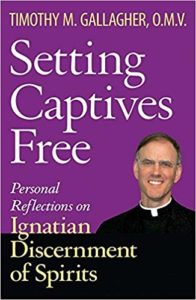

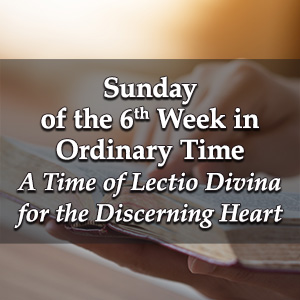 Sunday of the Sixth Week in Ordinary Time – A Time of Lectio Divina for the Discerning Heart Podcast
Sunday of the Sixth Week in Ordinary Time – A Time of Lectio Divina for the Discerning Heart Podcast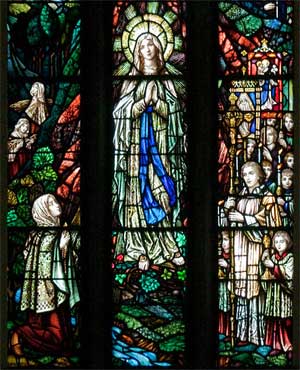 O glorious Mother of God, to you we raise our hearts and hands to implore your powerful intercession in obtaining from the benign Heart of Jesus all the graces necessary for our spiritual and temporal welfare, particularly for the grace of a happy death. O Mother of our Divine Lord, as we conclude this novena for the special favor we seek at this time.
O glorious Mother of God, to you we raise our hearts and hands to implore your powerful intercession in obtaining from the benign Heart of Jesus all the graces necessary for our spiritual and temporal welfare, particularly for the grace of a happy death. O Mother of our Divine Lord, as we conclude this novena for the special favor we seek at this time.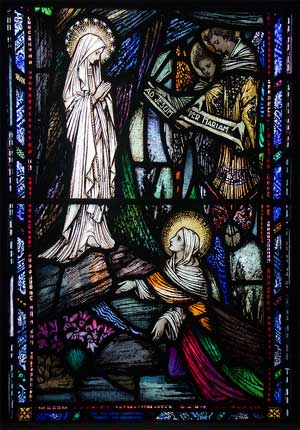 O Immaculate Mother of God, from heaven itself you came to appear to the little Bernadette in the rough Grotto of Lourdes! And as Bernadette knelt at your feet and the miraculous spring burst forth and as multitudes have knelt ever since before your shrine, O Mother of God, we kneel before you today to ask that in your mercy you plead with your Divine Son to grant the special favor we seek in this novena.
O Immaculate Mother of God, from heaven itself you came to appear to the little Bernadette in the rough Grotto of Lourdes! And as Bernadette knelt at your feet and the miraculous spring burst forth and as multitudes have knelt ever since before your shrine, O Mother of God, we kneel before you today to ask that in your mercy you plead with your Divine Son to grant the special favor we seek in this novena.
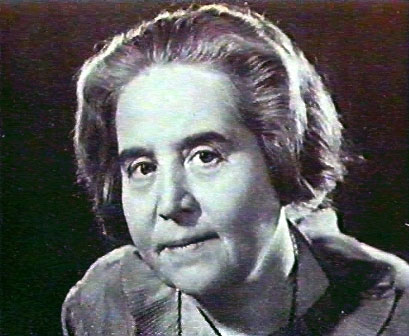
 O Almighty God, who by the Immaculate Conception of the Blessed Virgin Mary did prepare a worthy dwelling place for your Son, we humbly beseech you that as we contemplate the apparition of Our Lady in the Grotto of Lourdes, we may be blessed with health of mind and body. O most gracious Mother Mary, beloved Mother of Our Lord and Redeemer, look with favor upon us as you did that day on Bernadette and intercede with him for us that the favor we now so earnestly seek may be granted to us.
O Almighty God, who by the Immaculate Conception of the Blessed Virgin Mary did prepare a worthy dwelling place for your Son, we humbly beseech you that as we contemplate the apparition of Our Lady in the Grotto of Lourdes, we may be blessed with health of mind and body. O most gracious Mother Mary, beloved Mother of Our Lord and Redeemer, look with favor upon us as you did that day on Bernadette and intercede with him for us that the favor we now so earnestly seek may be granted to us.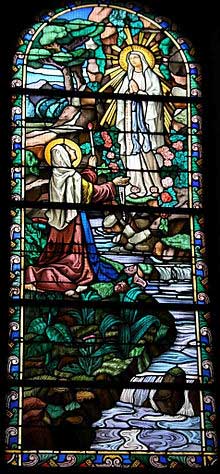 Novena to Our Lady of Lourdes – Day 6
Novena to Our Lady of Lourdes – Day 6
